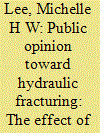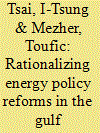| Srl | Item |
| 1 |
ID:
179676


|
|
|
|
|
| Summary/Abstract |
Model evaluation is best considered as a process for communicating with the policymaking or policy-advising community. Six decades of energy modelling have witnessed increasing complexity in these systems, a situation that raises a number of important challenges in using them effectively in policymaking organizations. When used as a learning rather than forecasting tool, these systems can be evaluated individually one by one or through joint efforts to compare them in multi-model exercises. After summarizing the evolution of energy modelling and efforts to evaluate them since the first oil embargo, this essay provides a guide to future evaluation collaborations by highlighting a few challenges that would improve the value of these studies for the policymaking community. These challenges range broadly and cover topics such as enhancing the engagement of the model user, ventilating the models’ complexity with intuitive insights, using simple models to demonstrate key parameters or responses, applying judicious occasional meta-analysis when there is value added, reporting model responses and calibrating them for decisionmakers, considering retrospective evaluation for a past period (when possible), selecting standardized or modeler-choice baseline conditions, selectively developing policy or diagnostic alternative cases, and institutionalising the model evaluation process for a specific topic or region.
|
|
|
|
|
|
|
|
|
|
|
|
|
|
|
|
| 2 |
ID:
166372


|
|
|
|
|
| Summary/Abstract |
A survey with an embedded experiment was conducted to test how residents would respond to a commitment by oil and natural gas producers to conduct nearby fracking operations in a manner that is more protective of health and the environment than existing state and federal regulations. The experiment specifically assessed how the use of independent third-party certification of operations coupled with "beyond compliance" practices would influence local public support for oil and gas development. The state of Colorado was chosen due to its long history of oil and gas development, its leadership amongst states in advancing fracking, and the current local-level conflicts surrounding oil and gas development. A public opinion survey (N = 390) of a representative sample of Colorado residents found that "green certification" of a production company's activities led to substantially increased levels of support for a hypothetical nearby oil and natural gas project. Our findings suggest that oil and gas developers can obtain greater public support for their projects by voluntarily engaging in practices that are more protective than current state and federal regulations together with third-party certification of those practices. In effect, these coupled actions serve as a mechanism that promotes a firm's "social license to operate".
|
|
|
|
|
|
|
|
|
|
|
|
|
|
|
|
| 3 |
ID:
176810


|
|
|
|
|
| Summary/Abstract |
The Gulf Cooperation Council (GCC) states are undertaking a number of energy policy reforms to cope with challenges from geopolitical tension and oil revenue depletion. These reforms are, however, different from those implemented in the western world for post-oil transition. This paper analyzes post-reformed state control over energy assets and energy transactions to provide an institutional view on the rationality of GCC's unique reform approach. Our study shows persistent but re-programmed state dominance over the energy sector, with energy assets owned either by national oil companies, non-oil state-owned enterprises, or public-private-partnership (PPP) agents with state ownership; and energy transactions governed either by state regulation or PPP contracts in the absence of any market mechanism. This institutional setting may allow the authority to sustain the legacy rentier social contract by expanding state-controlled rent source from oil to non-oil revenue and replacing low-power energy subsidy with high-power state-provided jobs as the rent for transfer. This institutional motivation will ultimately jeopardize market-based reforms and large-scale carbon regulation in the region. We elaborate the theoretical implications and discuss near-term development of GCC's energy policy reforms under the institutional-alignment constraints.
|
|
|
|
|
|
|
|
|
|
|
|
|
|
|
|